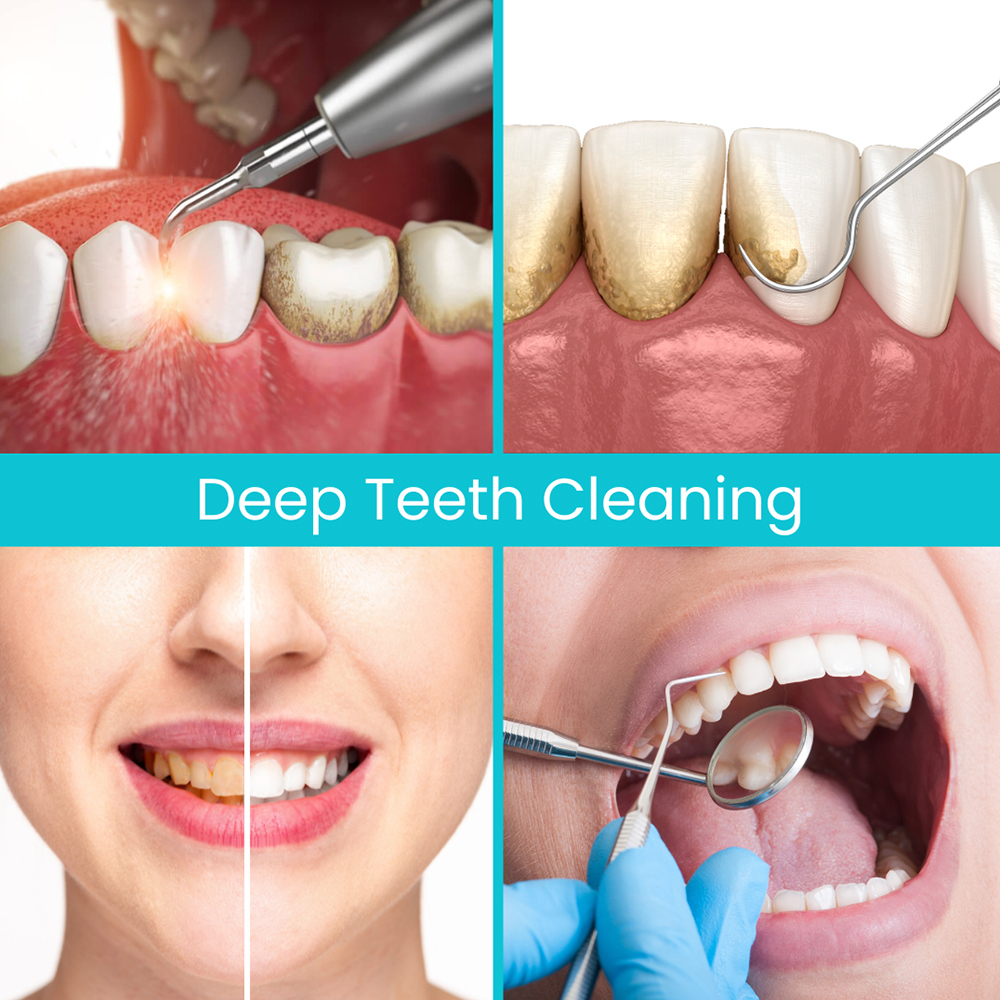Maintaining healthful teeth and gums requires greater than day by day brushing and flossing. For those combating advanced plaque buildup or gum problems, deep cleansing tooth earlier than and after offers dramatic effects. This particular technique is a recreation-changer in oral health care, but what exactly does it involve, and how does it benefit your smile? Let’s discover.
What is Deep Cleaning for Teeth?
Deep cleansing, also called scaling and root making plans, is a specialized dental system that objectives gum disease and heavy plaque buildup under the gumline. Unlike everyday dental cleanings, which focus on surface-degree cleaning, deep cleaning gets rid of bacteria and tartar from deep periodontal wallet and smoothens the teeth roots to prevent reattachment of harmful microbes.
The Need for Deep Cleaning Teeth
Dentists propose deep cleaning for sufferers displaying early to slight symptoms of gum sickness, along with:
- Persistent horrific breath
- Bleeding gums
- Receding gums
- Loose teeth because of bone loss
Addressing these troubles through deep cleansing can prevent extreme situations like periodontitis and tooth loss.
Signs You Might Need a Deep Cleaning
Deep cleansing isn’t for all of us, however certain signs and symptoms may additionally sign the need:
- Red, swollen gums that sense gentle to the touch.
- Bleeding all through brushing or flossing, indicating gum irritation.
- Plaque buildup under the gumline that ordinary brushing cannot dispose of.
- Sensitivity to warm and bloodless foods because of uncovered teeth roots.
- Receding gums or enamel performing longer than common.
How Deep Cleaning Prevents Gum Diseases
Gum disease is as a result of bacterial buildup that hardens into tartar, which irritates the gums and results in contamination. Deep cleaning enamel before and after allows:
- Remove harmful tartar.
- Reduce inflammation and bleeding.
- Restore gum attachment to tooth.
- Halt in addition development of gum disease.
Pros of Deep Cleaning Teeth
- Prevents Gum Disease Progression: Helps halt the development of gingivitis and periodontitis, maintaining gum fitness.
- Reduces Plaque and Tartar: Effectively eliminates harmful buildup from below the gumline.
- Improves Oral Health: Enhances average dental hygiene by way of concentrated on regions normal cleanings can’t reach.
- Fresher Breath: Eliminates bacteria accountable for terrible breath, leaving a smooth, clean feeling.
- Restores Gum Attachment: Promotes reattachment of gums to teeth, reducing periodontal wallet.
- Saves Teeth: Reduces the chance of teeth loss associated with superior gum sickness.
- Boosts Confidence: Healthier gums and teeth improve the arrival of your smile.
- Promotes Healing: Smoothens roots to save you further bacterial boom and encourage gum recuperation.
- Prevents Systemic Issues: Reduces dangers of health troubles connected to gum disorder, which includes heart disorder and diabetes.
- Tailored Care: Dentists customize the method to deal with character oral fitness needs.
Cons of Deep Cleaning Teeth
- Temporary Sensitivity: Teeth may also feel sensitive to warm, bloodless, or strain after the manner.
- Mild Discomfort: Patients may revel in tenderness or discomfort in gums for a few days.
- Cost: The manner can be costly, especially if more than one periods are required.
- Not a Permanent Fix: Gum sickness can recur without right comply with-up care and oral hygiene.
- Healing Time: Gums may take time to absolutely heal, specifically if the circumstance changed into superior.
- Requires Local Anesthesia: Some patients might also experience uneasy about receiving injections to numb the area.
- Potential Infection Risk: Rarely, flawed aftercare can result in minor infections.
- Multiple Sessions May Be Needed: Severe instances may also require multiple visits, increasing time and cost.
- Temporary Gum Swelling: Swelling or redness of gums is common immediately submit-remedy.
- Follow-Up Maintenance Required: Regular dental cleanings and proper oral hygiene are crucial to hold effects.
Deep cleansing enamel provides great benefits, however being aware about the potential drawbacks ensures informed choice-making approximately the manner.
Deep Cleaning Teeth Procedure
Scaling
Scaling removes plaque and tartar from the enamel floor and beneath the gumline the use of specialized dental gadgets.
Root Planning
Root planning smoothens the tooth roots, making it more difficult for microorganism to accumulate. This method encourages gum reattachment and recuperation.
Duration
The method may additionally take one or more visits depending at the severity of gum disease.
Benefits of Deep Cleaning Teeth
- Improved Oral Health: Eliminates microorganism inflicting infection.
- Stronger Gums: Reduces irritation and promotes gum recuperation.
- Fresher Breath: Removes odor-inflicting bacteria.
- Healthier Smile: Restores gum-enamel attachment, enhancing appearance.
- Reduced Risk of Tooth Loss: Prevents superior gum disease.
Before and After: What to Expect
Before the Procedure
- Initial assessment consists of dental X-rays and measuring gum pocket depths.
- Dentists might also use a neighborhood anesthetic to numb the region.
- After the Procedure
- You may experience slight sensitivity or soreness, which subsides in some days.
- Visible upgrades consist of less bleeding, more healthy gums, and fresher breath.
Recovery Tips Post-Deep Cleaning
- Follow Dentist Instructions: Use prescribed mouthwash to save you contamination.
- Brush Gently: Use a soft-bristled toothbrush to avoid infection.
- Maintain Flossing: Carefully easy among teeth every day.
- Eat Soft Foods: Avoid crunchy or spicy meals for some days.
- Schedule Follow-ups: Regular dental visits are essential for tracking progress.
Common Myths About Deep Cleaning
Myth 1: Deep Cleaning Weakens Teeth
Fact: It strengthens gums and eliminates dangerous microorganism.
Myth 2: It’s Painful
Fact: Dentists use neighborhood anesthesia to make certain comfort.
Myth three: It’s Only Cosmetic
Fact: While it improves appearance, it ordinarily addresses oral health problems.
How Often Should Deep Cleaning Be Done?
Deep cleaning is not a ordinary technique. Once completed, follow-up care and ordinary cleanings every six months help hold the consequences.
People Also Ask
What are deep cleaning teeth?
Deep cleaning enamel, additionally referred to as scaling and root making plans, is a dental system that eliminates plaque and tartar from below the gumline and smoothens enamel roots to save you bacteria buildup.
Why is deep cleaning important?
It’s important for individuals with gum disease, as it allows treat and prevent situations like gingivitis and periodontitis via removing harmful bacteria and selling gum fitness.
Does deep cleansing tooth hurt?
Most sufferers experience minimal pain because dentists use nearby anesthesia to numb the treated region. Mild sensitivity may occur put up-manner but generally subsides speedy.
How lengthy does deep cleansing take?
The system might also require one or extra sessions depending at the severity of gum ailment and the number of enamels handled.
What have to I anticipate after the process?
After deep cleansing, gums may feel smooth, and enamel might be sensitive for some days. Follow your dentist’s commands for an easy restoration.
Can deep cleansing opposite gum sickness?
It can’t fully reverse advanced gum sickness, however it efficiently halts its development and restores gum fitness in its early levels.
How plenty does deep cleansing value?
Costs range by location and severity but commonly variety from $one hundred fifty to $350 in keeping with quadrant of the mouth.
Are there any risks worried?
Risks are minimal. Some patients might revel in slight swelling or sensitivity, which generally resolves with right aftercare.
How quickly can I consume after deep cleansing?
It’s encouraged to attend some hours and stick with soft meals for the first day to avoid demanding dealt with areas.
How regularly need to I get deep cleansing?
Deep cleaning isn’t routine; it’s accomplished as needed. Regular dental cleanings each six months assist preserve its advantages.
Conclusion
Deep cleansing tooth earlier than and after is an exceedingly effective dental system designed to fight gum disease, eliminate stubborn tartar, and repair oral health. Unlike routine cleanings, deep cleansing objectives regions below the gumline wherein harmful microorganism thrive, stopping the progression of gum issues and enhancing universal dental properly-being.
The visible outcomes of the system—healthier gums, reduced inflammation, and fresher breath—are simply the start. Deep cleansing plays a pivotal position in maintaining the muse of your tooth, lowering the hazard of teeth loss, and promoting a confident, radiant smile. While slight discomfort during recuperation is regular, following your dentist’s aftercare instructions guarantees an easy restoration procedure and lasting outcomes.
This method is a proactive step towards maintaining not just oral health however basic wellbeing, as untreated gum sickness has been connected to broader health issues consisting of heart sickness and diabetes. Regular dental check-ups, coupled with diligent oral hygiene practices, can help maintain the advantages of deep cleaning over time.
If you’re experiencing signs like bleeding gums, horrific breath, or plaque buildup, consult your dentist to determine if deep cleansing is the right solution for you. A more healthy, happier smile is within reach with the transformative electricity of deep cleansing teeth before and after.

